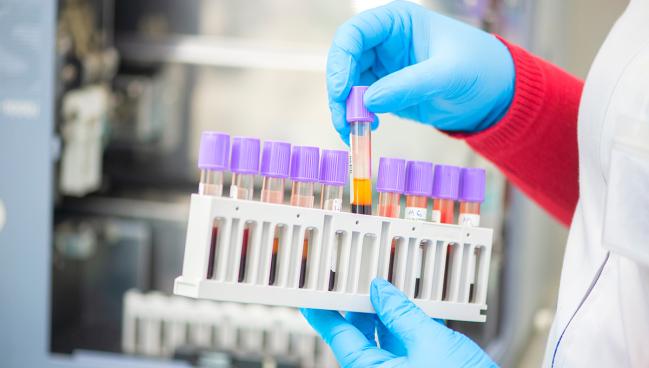High-Sensitivity Troponin Testing on the Rise in the US but Still Limited
Use of hs-cTn mostly didn’t lead to any significant increases in cascade screening and was associated with shorter ED visits.

CHICAGO, IL—Just one in three US hospitals are currently using high-sensitivity cardiac troponin (hs-cTn) assays, although that number appears to be on the rise, according to results of a new study.
The use of hs-cTn assays was associated with more echocardiography in patients with NSTE ACS, but less invasive coronary angiography in low-risk patients, report investigators. Implementing the hs-cTn assay into practice did not lead to more stress testing or CT coronary angiography.
Regarding the downstream cascade of care, lead investigator Cian McCarthy, MBBCh, BAO (Massachusetts General Hospital, Boston), told TCTMD the findings are “reassuring,” noting they line up with previously published research, including a recent analysis of electronic health records from five Mass General Brigham hospital emergency departments (EDs).
As for hospital length of stay, patients evaluated with hs-cTn had a slightly, but significantly, shorter visit compared with conventional testing (median 66.9 versus 67.8 hours; P = 0.01). In the low-risk chest pain patients, length of stay was 0.4 hours shorter among those who underwent hs-cTn testing compared with those who did not (P < 0.001).
“ED overcrowding is a huge problem,” said McCarthy. “Hospitals are often at capacity or close to it, and patients can end up waiting many hours, sometimes even days, in the emergency department. If high-sensitivity troponin assays can reduce ED stay times for low-risk chest pain patients, even if it is a small reduction, without compromising safety, then I think that’s a positive result.”
The study was published this week in the Journal of the American College of Cardiology and is scheduled for presentation at the upcoming American Heart Association 2022 Scientific Sessions in Chicago, IL.
High-Sensitivity Assays Boosted in US Guidelines
In Europe, high-sensitivity troponin has been the preferred biomarker to aid in the diagnosis of acute MI since 2015. However, the role for high-sensitivity assays has only been recently formalized in the US. In the 2021 American College of Cardiology/American Heart Association (ACC/AHA) guidelines for the evaluation and diagnosis of chest pain, hs-cTn assays are now the preferred standard for a biomarker diagnosis of acute MI (class 1, level of evidence of B). The US Food and Drug Administration approved the first high-sensitivity assay for use in 2017, with approvals for several others following in 2018.
The new analysis was intended to evaluate how many hospitals had transitioned from conventional troponin testing to hs-cTn assays. It’s based on 550 hospitals participating in the National Cardiovascular Data Registry Chest Pain-MI registry, an ongoing, nationwide quality-improvement initiative. It included 251,000 patients 18 years or older with type 1 MI, unstable angina, or low-risk chest pain.
In the first quarter of 2019, hs-cTn assays were used in just 3.3% of US hospitals participating in the registry. By the third quarter of 2021, that percentage was up to 32.6% (P for trend < 0.001). There were no significant differences in the uptake of hs-cTn assays across the geographic/community regions or by teaching hospital status, hospital bed size, level of service provided, nonprofit status, or annual MI volume. There was also no difference in use when hospitals were stratified by patient demographics or the percentage of uninsured patients.
“The implementation of high-sensitivity troponin [assays] increased steadily, but at the end of our study period, just one-third of hospitals had implemented the assays,” said McCarthy. “The study period ended in September 2021 because we didn’t have data beyond that period, and the new chest pain guidelines were introduced in October 2021, so it’s possible uptake will increase more dramatically. But we’ll have to wait and see.”
‘Detrimental’ to Care?
While the timing of the guidelines with the evaluated study period might explain why just a third of hospitals are using hs-cTn, it’s also possible there are some reservations on the part of physicians and hospitals, said McCarthy. As an example, he pointed to a 2018 poll by Michael Kontos, MD (Virginia Commonwealth University, Richmond), published on ACC.org, in which 21% of the 151 respondents stated they believed high-sensitivity troponin assays would be detrimental to cardiologists. Clinicians might have been worried that highly sensitive assays could lead to increased lengths of stay or an increase in unnecessary testing.
In terms of downstream testing, McCarthy said that patients with NSTE ACS who were assessed with hs-cTn versus conventional troponin assays were more likely to undergo subsequent echocardiography—quite likely for the assessment of LVEF—while testing with the high-sensitivity assay was less likely to result in invasive angiography for low-risk chest pain patients (compared with conventional troponin testing).
Today, there are multiple troponin assays and numerous accelerated diagnostic chest pain pathways for ruling out MI, each with different cutoff values for hs-cTn. Making sense of all the new information can be a little daunting, said McCarthy. To address those concerns, an ACC expert group published a consensus document on the evaluation of acute chest pain in the emergency department. McCarthy, who was part of that group, said that document was designed to provide practical recommendations, including information on the strengths and weaknesses of different clinical-decision pathways using hs-cTn, as well as information on various troponin assays and cutoff points.
“That additional information will hopefully be useful to hospitals who are thinking about making the transition,” he said.
Michael O’Riordan is the Managing Editor for TCTMD. He completed his undergraduate degrees at Queen’s University in Kingston, ON, and…
Read Full BioSources
McCarthy C, Li S, Wang TY, et al. Implementation of high-sensitivity cardiac troponin assays in the United States. J Am Coll Cardiol. 2022;Epub ahead of print.
Disclosures
- McCarthy reports consulting for Abbott Laboratories.





Comments